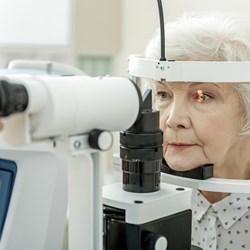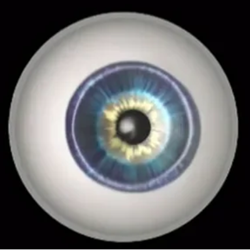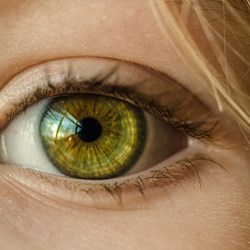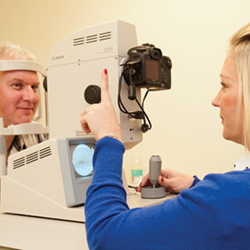Eyes
High blood glucose (sugar) levels cause damage to the blood vessels and the retina, which is the area at the back of the eye responsible for detecting light and sending messages to the brain to form pictures. The retina is fragile and covered in blood vessels.
Damaged blood vessels in the retina can leak and become blocked which is known as diabetic retinopathy. You will have your eyes screened yearly as part of your diabetes care so it’s really important to attend these appointments.
Controlling your weight, blood glucose (sugar) levels, blood pressure, and cholesterol and stopping smoking can delay the progression of diabetic retinopathy. Diabetic retinopathy is treated by laser therapy, injections into the eye, and in some rare cases surgery.
To find out more about diabetes and eyes, register for our Understanding Type 1 or My Type 2 Diabetes online courses or have a look at the resources below. To see what services are available in your area then have a look at the Local Services section.
Advanced Search
Resource type -
Language -
Type of diabetes -
Some people with diabetes develop serious complications with their eyes, called diabetic retinopathy. If you don’t get this treated properly, it can lead to sight loss. If eye complications do start to develop, they can nearly always be treated to avoid long-term problems – as long as they’re spotte…
This video explains everything you need to know about diabetic retinopathy. Through a series of animations, the viewer is taken through the journey of diabetic retinopathy.
This page provides information on what retinopathy is, the risks for developing it, and what happens at an eye screening appointment.
This information is for people who have been referred from diabetic eye screening because they need closer monitoring in a surveillance clinic or referral for further investigation or treatment.
This booklet tells you about diabetic eye screening. It is an easy read guide about a health check for people who have diabetes and are aged 12 or over.
This page explains the importance of eye screening when you have diabetes and what happens at your screening appointment.
This information is for people with background retinopathy detected by diabetic eye screening. It contains important information about signs of changes to your eyes caused by diabetes.








